NOTE: Sorry the formatting got a bit screwed up halfway through. Nothing I can do about it now.
For backstory on this event, go here and here. The TL:DR is that the antifa member pictured above, Dave Zegarac, intentionally did a hit and run on February 6th, attacking four Freedom Convoy protesters in Winnipeg, Manitoba. He was never charged with a hate crime, or terrorism charges, so I decided to call up the Winnipeg Police and get some explanation for why. I have called the police numerous times before, although I have to re-edit and re-upload those videos, because they show my face and I’m not quite ready to self-doxx again.
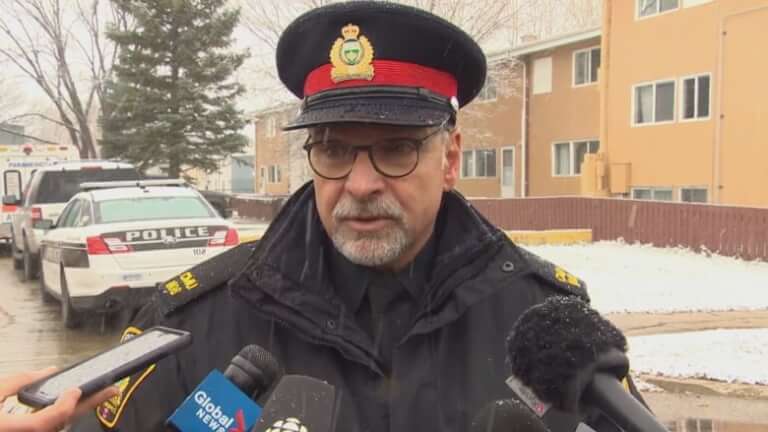
Constable Rob Carver, Public Information Officer for the Winnipeg Police.
In all my previous calls with the Canadian Police, they have been outright hostile to me, including ragequitting on my calls at least twice before. I’ll have an entire series on this coming soon, with most of the articles already written, just needing some tweaking. I expected more hostility from Rob Carver and the Winnipeg Police, but I was given a shockingly pleasant, polite, and productive conversation with him that lasted almost 45 minutes.
Below is a transcript of the entire conversation.
Rob Carver (RC): Media office, Rob Carver.
Me: Hi, I’m wondering if this is the correct line to call for information on the David Alexander Zegarac attack on February 6th in downtown Winnipeg.
RC: Well, it’s the Winnipeg Police Services Media Officer. Whether or not I can answer your questions depends on the questions.
Me: Well, do you want me to ask the questions and then you can tell me if you can answer them?
At this point, I was sure that I would get Rob Carver asking me questions like “who do you write for.” That’s a very common question the cops are trained to ask. If you answer with anything other than “some accredited propaganda outlet,” they come back by pointing out that they have media releases and you can send them an email, and blah blah. Shockingly, that didn’t happen this time.
RC: Sure.
Me: Awesome, so the first question I have is, I wanted to give a little bit of time to see if some new information came out, was published on your twitter account, or your website or what have you. But I just want to know, why were there no terrorism charges or hate crime charges laid on David Alexander Zegarac for what to me looked like a premeditated political act of terrorism done to the freedom convoy protesters.
RC: So, investigators can only lay charges where there’s enough supporting evidence to put those before a crown attorney. And when charges aren’t laid it’s because there isn’t enough supporting evidence. So in this case the only charges that were supported by what we were able to put together in the investigation were the charges that were laid.
Me: Well now thank you for that answer. It’s sort of a restatement of the definition though. I mean the guy was undeniably an antifa member. And he talked about being an antifa member, being an anarchist etcetera etcetera, and then he goes and commits what looks to be a pre-meditated political crime. Stop me if I’m incorrect in saying that. But what looked to be a premeditated act –
RC: Well what looks to be a premeditated act in terms of social media and commentary is different then beyond a reasonable doubt that we can prove in court. So anything that may have been produced subsequent to his arrest and charges, in terms of his background, isn’t relevant to this specific incident at the time, unless they can be tied to it.

I did not do this call to debate Rob Carver. So I simply noted this as ridiculous, and tried to formulate a strategy to catch him admitting how ridiculous this was.
Me: So to be clear, once you uncover social media posts you cannot retroactively change his charges for the event?
RC: So, we would have to be able to one – so, so when a person does an act and we’ve arrested him. We know his comments. It – we do not look back on someone’s social media posts to understand why they’ve done something. I could pull all sorts of things about an ex-wife and, and then end up in a collision with her. That doesn’t mean that comments I’ve made before can directly be implied to be part of an action later. It’s just not possible in a court of law.
Me: Okay.
RC: It doesn’t matter what people read or see on TV.
Me: Of course, we are calling to ask, to be informed.

I will stress once again that Rob Carver was by far the most helpful and least nasty cop I have ever had the, in this case fortune, to deal with. Once again, I didn’t do the call to get into a screaming debate with him, and there is a gem of plausibility in what he’s saying here. There have been cases, and this came out in the Rittenhouse trial, where there have been rappers who wrote songs about killing some specific guy, and this wasn’t allowed to be played at their trial. It depends a bit on the judge, but there are a lot of things that can be considered prejudicial, even if, to the layperson, they are obviously connected.
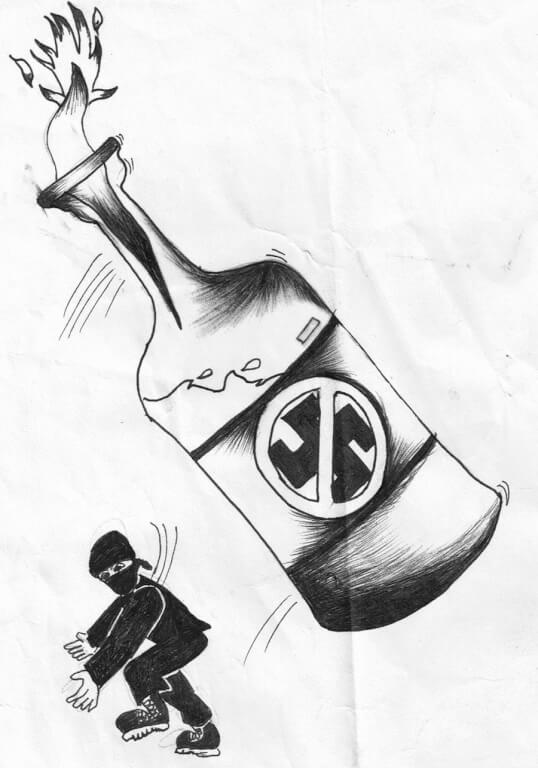
Dave Zegarac drawings.
Having said that, it’s still ridiculous. The police speculate on motive all the time, and have no problem even publicly bloviating on motive when they’re wrong. See the example of the West Vancouver Police doing exactly that in my skidmark of hate article. The WVPD is not the Winnipeg Police, and it’s theoretically possible that the Winnipeg Police simply do not publicly speculate on motive. The next step is to find them doing exactly that for a different crime. In 2019, there was the jew hate hoax involving the swastika, which I wrote about here, but I couldn’t find any killshot quotes from the Winnipeg Police assuming motive. We all know what’s going on, but I can’t catch them red-handed on this.
Me: The second question I have is this police Chief Rob Parker, I hope that’s his name.
RC: That’s me actually it’s Rob Carver.
Me: Oh, Rob, how are you doing?
RC: I’m a public information officer.
Me: Constable, public information officer Rob Carver, sorry about that.
*both talk at once.
Me: I’m sorry I interrupted you.
RC: No I just said no apology necessary.
Me: Okay thank you, Rob. Now you said in your initial press conference and I couldn’t find any other video of you speaking, other than the Global News YouTube video. Hopefully there are some other out there but you said, and while I don’t want to rehash your words to you there are –
RC: I’m on our Facebook page. That video in its entirety is posted on the Winnipeg Police Service Facebook page. Along with our press conferences if you need to.
Me: Right, thank you very much for that resource. But you said a few comments to the extent of “well, when he resisted arrest,” so he hits the protesters he drives away, the police chase him down. He resists arrest, there’s a little bit of a scuffle, altercation, whatever you want to call it. And he’s saying some things, and you said they weren’t specifically related to the mandates themselves.
RC: Right.
Me: And you were asked about this a few times, and at least in the 20 minute long video I saw you didn’t elaborate on what the comments he made were. So to put it very bluntly, what were the comments he made to the police officers after being arrested?
RC: Well I’m afraid I not legally able to give you that information. Why I said what I said, and why the police service, the Winnipeg Police Service, wanted me to get that out, was to be clear to the public that he hadn’t taken a pro-protest position, or an anti-protest position.
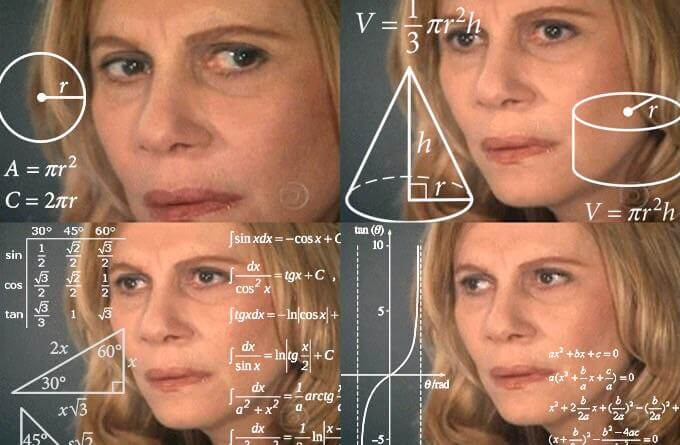
I mean he literally showed up to the protest and drove over four of the protesters. Sounds like a pretty cut and dry example of an anti-protest position. Again though, my job was to get information, not angrily debate him.
RC (continued): That he wasn’t on either side of those fences regarding people who were on Broadway (the street involved) for various political leanings. What I wanted to say was he made comments that, while they couldn’t lead to other charges, lead officers to believe that he wasn’t specifically looking at pro, or against mandates. And we felt that was important to get that out, because there was the potential that he could be sort of raised up as a martyr or you know, pro or against one particular group. When he made some comments that suggested to the officers that that wasn’t what was happening. And whether those were of a nature that suggested, you know, I’m going to throw some hypotheticals at you.
Me: Sure, sure.
RC: Whether they were religious in nature. Or they indicated some mental instability. Or they indicated some other mental mechanism. What we wanted to be able to be clear to the public, was he wasn’t for or against any of the groups. Because we did know that, without saying that, people could draw erroneous conclusions. And somehow think that it was in support or against one side or the other. Which could inflame already frayed tempers. So that’s why the comment was made. We wanted to, uh, mediate that risk. But I’m not able to say, because it isn’t supported by charges, what he said. We can’t do that.
The cops not releasing information that is highly damaging to BLM/Antifa/others to not “inflame tensions,” is a very common strategy of theirs. Since they decided not to charge him with any crime that has to do with his charges, they are not legally allowed to explain to the public what he said to the cops. How convenient.
Me: Okay. So I understand that there are some legal issues where you can’t necessarily tell me or the general public everything that we would like to know. But I just have to say, when it comes to erroneous beliefs the public might get, I think you can sort of understand why people would think that he was against the protest, considering he quite literally ran over for people who were protesters, it would be a little silly to think the opposite. At least you would think naively, that –

RC: Well let’s just dissect that for a sec. So he could be against the protests, because he felt that the process of protest was, and I’m being hypothetical here, was infringing on his rights to travel downtown. And he wasn’t against their political beliefs or their views in terms of vaccine mandates, that he was simply tired of disruptions in the downtown area.That doesn’t mean he’s taking a political stance, that just means he’s frustrated. And while I didn’t get into it, it could have been an act of road rage that had nothing to do with politics. So yeah, he would be against the protest in general, but not against the politics of the protest. That’s why this became an incredibly difficult press conference for me to hold, because people can draw their own conclusions. And as an as I’m going to guess, you have drawn some conclusions. Uhm –
Me: Well I think we all have. It’s hard not to, right?
RC: I’ve watched and been part of hundreds of interrogations and interviews of suspects, and lots of times things that they say unless they come out in a court of law. And often it’s not like in the states where where they release all of the video footage or someone is uh, someone is interrogated or interviewed. People make all sorts of comments in those situations, and they may not necessarily be relevant to the actual charges that end up getting laid. And when they aren’t, we can’t release. So if he made comments that were, you know, that that sort of helped us understand why he did what he did. But but we can’t release them because they weren’t specifically related to the charges. Then they get into that murky gray area that makes people and I understand it very frustrated.

But we’ve got real constraints on what we can say. And I want to add and I’m not trying to defend myself, but what a public information officer says is very different viewed by the courts of law in Canada, say then what a reporter says? So I have the potential with my statements to be prejudicial to court cases. I am held to a higher standard than say, somebody who’s talking on, for say, Global news for instance.
Me: No, I mean that almost goes without saying. But I have to circle back to something that you said earlier with what you’re saying now. Where basically, if someone hasn’t been charged with something, then it’s hard legally for you to justify bringing up comments that they made. That might prejudice, you know, a jury against them, even if it’s just for being a bad person.
So let’s say someone’s a pedophile, and they get into a car accident, then you can’t bring up that they’re a pedophile because maybe the jury would just want to convict them for that. You know, erroneously.
RC: A judge typically wouldn’t allow that to be presented in court, it’s prejudicial.
Me: Of course, yeah, that that’s pretty well understood. But to circle back to what you were saying earlier, you said you have to have, you know, the charges that are laid need to be sort of beyond a reasonable doubt, to get a conviction. But it’s not like, you know, you have a 100% conviction rate, I mean, there is a certain amount of gray zone, when it comes to people are charged with things that you really can’t be 100% certain they’ll get convicted on because well, you don’t have 100% conviction rate. It’s true by definition.

RC: Oh absolutely. And there’s no argument there. But understand that there’s a hurdle before it goes in front of in front of a judge, and that’s the current prosecution’s office has to look at our case, and, and concur with the charges or may modify them. So we put together a case that we consult with a Crown Attorney, unless it’s very simple. I mean, if we catch a guy inside the house. He’s broke into a house, he’s got the screwdriver, and, you know, we don’t need to consult with with with prosecutions on that. But we would hear and okay, I’ll get back to sort of the gorilla in the room, you know, I’ve been made aware of from various sources, some some of the public that that what, that what he has said, historically, is of a you know, of an anti white supremacy, white supremacy conspiracy kind of narrative. And what you just said a few minutes ago was critical.So you can say, all you want, and it can be as objectionable as you want. But unless a statement is found, and it has to be factual, that says, I’m going to run over those assholes standing over there, because I believe they’re white, white supremacist. Unless you say that you can have all sorts of strongly held opinions about a group. But unless you express some sort of violent intent, intent being critical, then you can’t extrapolate from somebody statements in general about their political beliefs that they carried out an action because of those political beliefs. It simply won’t stand up in court.So so I’m gonna look at an example of an actual person who’s in charge of some sort of terrorist attack. If we go back, and investigators go back and find Instagram posts, or chats on his phone where he could be female, but for sake of clarity, where he said, you know, I want to kill all those bastards, or I want to – some statements that’s declarative, in terms of linking beliefs with intent. And you can’t lay the charge. You can surmise that there might be an underlying connection. But surmises don’t get in front of a court and –
Me: No, no. Rob, I understand that you’re speaking very carefully. But I think I understand what you’re saying. That’s kind of not really the issue here. I don’t expect to hear juicy sound bites from a public, what is essentially a public relations officer for the police. But I hope you can understand to the general public, this looks a little bit… I don’t want to say suspicious, it looks a little bit off. It looks a little bit weird. Because you’re saying for instance – that this guy, I think we agree, he talked about being an Antifa member. It’s just objectively true. He has pictures of throwing Molotov cocktails. You know, I could go on and on and on. The guy is is clearly politically active, and has participated in many political protests, as he would refer to it, in the past. But it’s, I mean – what is the motive here?You’ve said that there were many reasons he could have done this. It could have been a political act of terrorism, sure, but it could have just been road rage. It could have been [that] he was off his meds and hallucinated that these people were bunnies. There’s a lot of things that it could be, but there was one thing that it was. And I don’t mean to say this in a rude way. But I after talking with you, I have no better understanding of what his actual motive was, or even the theorized motive from the Winnipeg Police.
RC: So one of the things that said, I believe in that press conference, but it’s certainly a number of other press conferences that I’ve held. I’ve talked about the fact that unless we get a specific statement, that it’s almost impossible for police to attribute direct motive to a crime and we go out of our way to not do it, because it’s supposition. It’s very hard to get inside someone’s head unless they say, I did X because I, whatever, I hated the person who slept with my wife. That’s why I so so.

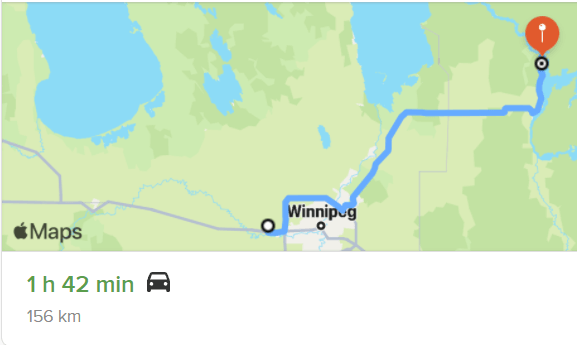
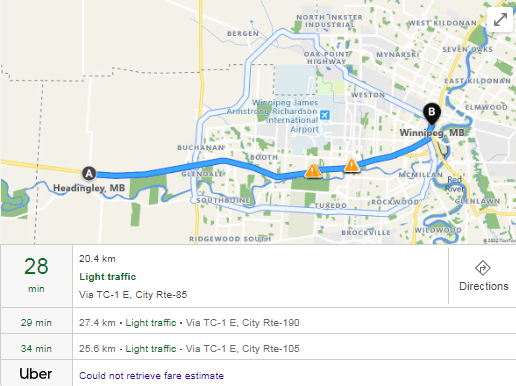
So even when we get that, investigators are aware of the fact that people will make statements in those types of situations, which are factually incorrect. So I’ve seen people talk about why they’ve done stuff, and they finish the investigation and gone, “oh I think he lied to me”.So we really go out of our way, and I’ve done it in a number of press conferences, to say, we try to not get into motive, because it’s almost impossible to confirm it. And if I do it. If I talk about motive as a PIO, Public Information Officer, a court can view that as prejudicial where I state someone’s motive for doing a crime. So it becomes very, very, very dicey for a police spokesperson to talk about motive when there isn’t a clear, definitive connection between the motive and the act. And there isn’t here. I understand all of the supposition.But you know, what’s interesting is that I’m just reading a piece about Mounties, possibly hugging protesters in Alberta as they left.
Me: Sure.
And I think I think there’s a potential set of beliefs that the police secretly support the protesters. And I know when I did my first press conference on February 8th, I got a number of groups who said that, and I think it was that one actually, that I was able to stay fairly balanced. And I worked very hard at doing that. Because we neither support nor are against, and we can’t be, about why someone is out there [at a protest]. But given what allegations are floating around that, you would think if there was a possibility that we could charge a guy with going after these protesters in a terrorist or hate related motivated crime, that we would do that. Just talking suppositions here. We don’t, not because of any political beliefs, for or against, but because, like. So I’ve been doing this a long time –
Me: I understand, but I appreciate –
RC: Unless there is like unless a video surfaced, where he says, standing there, I’m going to take out some protesters tomorrow night and then does it. It is effectively impossible to lay the charge. And the charges you’re talking about are required by law in Canada to have crown consent. So we can’t lay them and put them forward and go “oh we didn’t talk to a crown this time”. They can’t be laid without it. So terrorism charges are one, first degree murder is one, can’t lay them without putting the case before crown and getting a crown, senior crown, to say, “Yep, I agree.” We do homicides all the time. We think it looks like a solid case of second degree murder. Crown says “no manslaughter only,” then it’s manslaughter only.
So in this case, and I haven’t talked to investigators about this, but they may have said, you know, we’re finding some social media background that suggests this guy has some pretty extreme ideologies. Unless the crown says, “I want to see those, I’m prepared to make that link.” Then it’s irrelevant to what our investigators think it’s because in a court of law, the ability to prove the link between statements I make and actions I do are are just so difficult in court that crowns are reluctant to do it, as are investigators. So if every person who had ever said “you know I wish I could do extra that person, and then something bad happens.” If there was you know, if we could do a link we’d have 1000s of more people in jail.
But I understand your frustration and I wish – I communicate for a living. And I’m not trying to dance on the head of a pin. I wish I could clearer, but I’m not sure how else to sort of frame the argument that I’m stuck with.
Me: Okay, well, I everything you said. I can, understand. Not necessarily agree, but I mean, it’s your job, not mine. But I think you have to acknowledge to the general public that Antifa member did a hit and run, ran over four protesters. Now, you know, I’m sure that – I don’t think these people are Nazis are fascists or whatever. I’m sure that you could easily find plenty of Antifa members saying these people are fascist Nazis. This guy’s talking about “bash the Fash,” literal song of his. Numerous violent lyrics in the various bands he’s been in. Forces the Winnipeg Police to chase him down and then resists arrest. And then says something that you won’t release to the general public.Now, if I had to, if I was a betting man, I think I would bet 95 plus percent, that this wasn’t a road rage incident, this wasn’t you know, he had a hallucination and thought they were lizards attacking him. That this was an act of political terrorism or hate crime, one of the two. And it was absolutely 100% related to his political beliefs, or 95%, is what I would bet. Now I understand that you’re saying, you know, you absolutely have to have certainty when it comes to charges laid.
RC: Well, not certainty, but high probability.
Me: Right, high probability. But I mean, if this isn’t high probability, now, again, this isn’t a debate, and I’m not trying to put you on spot. But to me, and I think most of the public, if this isn’t high probability, then I don’t know what it is. It’d be like if somebody said, you know, to your example, it’s like if a man’s wife is murdered, and he’s got blood over his hands, and there’s social media posts of him talking about how much he’s gonna enjoy not being married anymore, and how he’s trapped in marriage. I mean, I just think that there’s a lot of things that aren’t 100% “Yes, I’m going to kill her tonight at precisely 730. And I’m going to do with it with the rusty fork that I’m going to be stashing in the garden over here.” You know it’s a lot of things that are high probability. Right, and and like you said, not every charge you guys put before the court actually gets results in a conviction. So I mean –
RC: Right, absolutely. So the example you’ve just given, I’ll just use it to sort of further the conversation. So when someone commits murder, and they talk about, you know, their intent, that’s one thing. Motive is actually a little bit different. So if he’s at a bar the night before, and he goes, “I’m going to kill a bitch.” And he then is found with with a dead wife, we can conclude that he intended to kill her.
Me: Right.
RC: What we don’t have in most cases, is a clear indication of why he wanted to do that. And often, sometimes investigators will get it but it doesn’t become relevant to the case. Sometimes it does, but it doesn’t always. So if you found out that she was having an affair, if somebody found out, you know, if somebody found out that she had been emotionally abusive to him for years, or you know, any number of things. They become secondary to, did he say he was going to commit an act? Yep. Did he commit an act? Yep. Does it look like it was premeditated? Yep. Then it’s first degree murder.
But motive, and I’ll talk about the case now on Broadway. So unless he says, somehow, I hate whatever, white supremists, or whatever, and I want to take some out. Something to the effect of – that we can ascribe to hate related elements to drive it. It’s really dicey.So I don’t lay the charges. I stand up there and talk and I try and answer questions from people who, like yourself, who want a better answer. But I don’t lay the charges. So when I dance around and say, you know, went back to the definition of, you know, we lay the charges the evidence supported, it’s because that’s what we’ve done. And I, I’m worried that what I’m not being able to convey is… you know, I know I hear it all the time I see it on social media, that there’s a sense that the laying of the charges at this level is political. And I can tell you that it’s simply judicial.
If a crown thought there was the ability to lay more additional charge related to a hate related crime or terrorism, they would have looked at it. It wasn’t in discussion at the time, and it didn’t get laid. Not because – I mean, I know it sounds trite. We just lay the charges that the evidence supports. Sometimes we don’t get to lay those charges. But my understanding here and my discussions I had with investigators was that they didn’t feel at the time, that there was enough evidence to support anything but what was laid.And the reason I went in, and I don’t want to beat the horse, but the reason I went into the details of some stuff, but it didn’t wasn’t pro or against was because we were worried that somebody would think that, you know that a counter protest movement against the protesters on the ledge, had decided to do it for specifically pro Vax beliefs. We felt that was important. And while I could say definitively, we don’t believe it was that, I can’t say definitively we do believe it was this. Because one gets me in trouble and puts me at risk of contempt of court. And one doesn’t.
Me: Okay, okay. Let me sort of say, back to you, what you said to me. Let me first say this, by the way that I’ve called in to a lot of police offices here in Canada, and you have by far been the most gracious and most educational. So if – I don’t want to seem too confrontational, but there’s a few things I need to sort of clarify. So first of all, you said, now, it wasn’t in discussion the charges of political terrorism. I mean, how could it not be in discussion even? That seems like it was sort of –
RC: Don’t don’t go that far down that path. I’m saying it certainly wasn’t something I was a part of. Did investigators say to his partner investigator, “you know I wonder if there was a political motivation based on what he said”, when the first guys got him? Possibly. But then they need to look at whether or not that supported by other stuff. So I’m not I’m not going to stand here and tell you, sorry I don’t know your first name, but I don’t need to. I’m not going to stand here and tell you, sir that detectives never had that discussion. I’m going to tell you that they didn’t have the discussion at a judicial level. When they put the reports forward to the Crown to say, we think we should be looking at these charges as well, based on this evidence.
Me: Okay. Okay. So I should walk back a little bit what I said there. Or the the question I asked, I guess. I guess that’s why I need to ask it. But with all due respect, I know you say you simply cannot, I just want to clarify, you simply cannot tell the public, you are legally prevented from telling the public what he said to the officers when he was arrested?
RC: That’s right. So –
Me: But I have I have to say. Now again, I just want to say what this looks like, this looks political. You said it’s not political. You said there’s a lot of people in the public who are thinking at this sort of level, it is a political decision not to charge him with an act of political terrorism or a hate crime charge or what have you. Which by the way, the Winnipeg police do have, you know, hate crime charges out there for various other things. But it’s so hard, it’s so difficult to have any other interpretation.And when you said that you had some groups that were pushing back on you, because it looked like you might have been supporting the protesters here. That’s a little bit ridiculous to be to –
RC: You can’t make that conclusion. I didn’t say we had it, but I’m certainly seeing people saying, you know, online, not necessarily about us, but that the police are pro protesters. Because in Ottawa, and here to some degree and in Alberta, that there’s this view that enough strong action hadn’t been taken, to somehow rapidly kind of dispatch those situations. So I’ve seen elements of that kind of allegation, but I’ve sidetracked you. I want to get back to what you’re saying. So –
Me: I mean, I mean, we can just agree there’s there’s many different opinions here. You could find people who have the exact opposite opinion, that the police have been way overbearing, etc, etc. Showing up, you know, with with assault rifles in some cases in Ottawa in some pictures I saw. So I don’t want to take too much of your time. I know I think you’re actually off right now.
RC: No, I’m on until five.
Me: Okay. Well, in case thank you, you’ve been you’ve been very helpful. But I think there’s just a bit of an impasse here where, you know, I don’t think you could do anything really to satisfy me or people I’m going to be writing this up for. When it comes to the –
RC: My job is to sound like I can answer every question you put in front of me, not to satisfy you sir.
Me: Of course. Of course.
RC: Let me bring up this example that might help put this in some perspective for you. A couple years ago there was this individual in Toronto, took a van and drove through all sorts of pedestrians, and killed I believe 8 people.
Me: Sure. Okay, I’ve never heard of this. But go on.
RC: Okay, name was Minassian I believe. So it was questionable, based on his last name, and there were some people trying to connect the dots maybe to his ethnicity and possibly terrorism charges for that. And it turned out later, what they found post trial, was that he was an incel.
Me: Uh, sorry, this guys name is what exactly.
RC: Minassian I think. If you Googled “Van Driver kills 8 in Toronto,” I think you’ll get it. He was eventually *inaudible, police officer was able to arrest him with minimal force. Which got a lot of press as well because there was some questions as to whether he should have shot because he killed 8 people. He wasn’t charged with anything related to what he had posted online. And then we always look at, you know, case law and what’s dependent on other jurisdictions, and that’s hard.
So he made all sorts of comments, and the conclusion has been drawn, with a fair degree of certainty, that he was a virulent misogynistic individual, probably supporting incel beliefs. And, uhm that is what drove him to that act of violence.
Me: Okay.
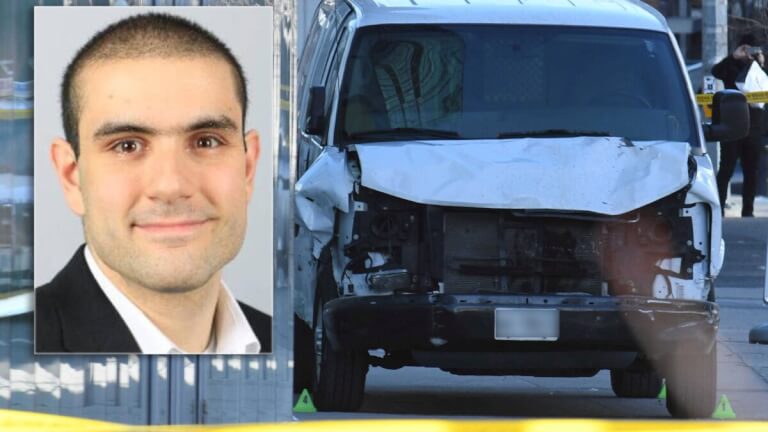
Alek Minassian and his van.
RC: It didn’t become relevant in the court case. For whatever reason. Uh the crowns and court didn’t take that route. They looked at his actions and there was a lot of questions. Why wasn’t he charged with an act of domestic terrorism? And because of lots of incidents of violence, lots of women for sure were asking “this was specifically an act that looked like it was based on, you know, these very uh, angry beliefs about women and how they should be viewed in society, why wasn’t he charged with that?” I don’t have an answer, I don’t work in Toronto. But I know those sorts of things lay the groundwork certainly for lesser, and less egregious examples. Uh we didn’t have 8 people here dead, thank god.
Me: Yes, thank goodness.
RC: For what we can and can’t charge with respect to motive. And I think as that case was unfolding there was a pretty clear connection of thoughts, for why he did that. It doesn’t add to the court case because, again I’m going to stipulate, but because the attribution of actions to specific motives is really murky in law.
Me: Okay, I don’t mean to be so rude but I need to interrupt you right here. So I looked up Alek Minassian. And the judgement by justice Anne Molloy dispelled the fact that he was an incel. He wasn’t an incel. That was just an erroneous conclusion. So, he was just a guy who wanted to set the record for most kills, and so he just was not –
RC: Again he had… okay –
Me: Well according to the judge. I understand that maybe even he was, but it’s a high bar for a judge to give a judgement. You’ve been saying similar things and I think –
RC: That may have some relevence to what we’re talking about here.
Me: Right. So it’s not that, how do I say this, it’s not the general principle that anything that looks vaguely political wouldn’t get political charges. Wouldn’t get terrorism charges, or hate crime charges. It’s just the specifics of the situation here. Where you have a guy who has a long, long history of being an antifa, which never came out in your press conference, but, like you said, perhaps you thought that would have been prejudicial to the jury. Sort of like if you brought up that some guy was a pedophile, and he gets into a hit and run and hits someone.But it is true that the guy’s been an antifa and an active political member, you know there’s videos of him on YouTube at Occupy Newfoundland protests, etcetera etcetera. And he goes to the Freedom Convoy, I believe it’s called I wasn’t there obviously, protest, and he drives over them. Now, I don’t want to reiterate the point over and over again, but one last question, which is why was he there in the first place?
RC: I don’t think we know. Unless he tells us why, and he didn’t tell us why, we’ll never know.
Me: Well, so he wasn’t just like, trying to get to a store, and he got stuck in traffic?
RC: So the questions you’re asking are all valid questions. But they’re not necessarily questions that we can determine when laying the charges. So I’ve sat in rooms across from an individual. I’ve been in rooms for variations of three, four, five hours. If the person says “screw you I’m not going to tell you,” we can make all the suppositions we want, we can’t know why someone does something. We just don’t. And it’s reasonable to conclude that given that he lived out of town, we said he was a resident of Headingly, given that he was there at that time, that likely, likely he was there maybe to do harm with his vehicle. Likely, doesn’t get into a court of law, and I wanna get back to what I said earlier.

I, have a lot of training in this particular unit for what I do. And I have been told time and time again by legal counsel, that what I say on camera, as an officer of the court, as a uniformed officer, is different than what other people say. And you can make suppositions and feel very comfortable logically that there’s a high degree of likelihood of what you said. I can’t say it. I can’t. And I’m told regularly that if I did, I would be personally subjected to contempt of court. Now that’s a big deal. I’m bound by different rules.Me: No, I –
RC: As far as laying the rules –
Me: Mr. Parker. Constable Parker, I believe is the honorific.
Me: If you feel like I’m attacking you for the actions of –
RC: I think you’re passionate about what you’ve looked at, and I respect your passion, sir.
Me: Thank you very much for that. But like I said, it’s starting to be more than high probability. Again, to the layman. You’re the one who’s been there in interrogations. You’re the police officer and it wasn’t even your decision. So again, don’t feel like I’m throwing this on you personally. But you have a guy where you don’t understand what the reason is for him to even be there in the first place. He’s an antifa member. He refuses to tell you why he’s there in the first place. He drives over, uh, four people, and a hit and run. Doesn’t seem to express any remorse. And resists arrest, and when he gets arrested he’s probably yelling something about “White Supremacists, White this White that.”And we’ll never be allowed – you will never be allowed to tell the public what he said because there was a decision made that he wouldn’t be charged for terrorism, despite the fact that, again, we don’t want to do sort of tactical nihilism where you never really know what anything is. But yes, theoretically everything he did could be motivated by road rage. He could have a weird psychotic episode that had nothing to do with his history as an antifa member. But all signs would point to, almost to a sort of parody like level, all signs appear to indicate a premeditated terrorist attack by an antifa member.Now again, I know you can’t agree with that. And I don’t want to put you on the spot, and get a little gotcha from you, because you can’t legally agree or disagree or whatever. But, I’m just saying. Is there something you can give that would assuage the public’s belief that there was a political coverup that happened here? ‘Cause, I’m sorry, I know you can’t agree, but all signs indicate, all signs lead to terrorist attack by antifa member, premeditated, with no terrorism charges.
RC: So, first of all… I don’t wanna sound, uhm, rude, but, so terrorism charges in Canada have an incredibly high burden. So, to lay a terrorism charge, it’s not the crown prosecutor who has to prove, it’s the Attorney General. So, like, the detectives I work with, and my colleagues, they could see that, but they would need an unbelievably high burden of proof to put that forward, and it would have to go to the Attorney General. That’s the level for terrorism. And terrorism is unique.
There is no set of hate crimes in Canada. And I have an entire set of studies when I want to explain to people why hate crime charges aren’t laid. There’s really very little in terms of hate crime charges in Canada. So unless you’re actually doing something very motivated against them with this institution, you know if I said, I’m White, but if I said I hate White People, and assaulted somebody because they were White, uhm, that doesn’t change the nature, it’s still just assault in Canada. And I’m not saying I agree with it.
Me: Of course, you’re not a politician.
RC: There’s a hole in the law here. And I’m going to tell you something else. I’m born and raised in this city. I’ve got multiple degrees. I did something before becoming a cop. I’ve worked sort of everywhere and now I’m a media spokesman because I like to talk.
Me: Right. I can see that. Don’t take that the wrong way I can see that. I appreciate it though.
RC: I can tell you, and you can believe me or not. If I had one suspicion that there was a political coverup in terms of laying charges here, I don’t think they’d let me be by the phone. I really don’t. I’m passionate about what I do, much like you sound like you are. I know cops make all sorts of mistakes, we’ve got bad apples in our organization, just like any organization. We are subjected to the same human frailties that any organization is. But I can tell you, in my experience now of almost 30 years, that that’s not what happened here. You don’t have to believe me, but that’s not what happened. It’s not a political coverup. The bar is high, and I’m gonna say something else, but maybe this will help you.
If we had charged him, with some sort of act of terrorism, and it got to the Attorney General and was approved by the Attorney General, and was based on comments he made when he was arrested, I would still be barred from telling you what those comments were, because I can’t do that publicly before the case goes to court. Uh, can you hold on.Me: Yes, take your time
RC: Are you still there?
Me: Yes, I’m still here.
RC: Okay, I wouldn’t be able to do that and it happens quite regularly when we have a murder case. They wanna know “did you locate a weapon.” Yep we did. “Can you tell us what it is?” No, I can’t. I’m not allowed to get into details of evidence. So if the reverse had happened I’m not able to answer your questions to an extent that would give you any satisfaction, because I can’t.
Me: Okay, we’ve talked, my phone says 42 minutes long.
RC: Yeah.
Me: It’s been a good one, it’s been good. Like I said, I’m not exaggerating when I say I’ve called into the cops, RCMP every time before this, which you are not a part of I don’t believe.
RC: Nope.
Me: Right, independent. And you are by far the most courteous and helpful and polite officer I’ve ever had the fortune, in this case, of dealing with.
RC: I take that as a huge compliment.
Me: So please – I have to ask some questions, I have to ask them quite forcefully. And I’ll just tell you right now that I don’t agree with your conclusion that this wasn’t – that there wasn’t political motivation here for the charges laid. Especially because, [since] there were no charges laid, we can never know what he said, even after the trial. And I think that would be very politically damaging for the wrong people. So we’ll just agree to disagree. But again, you’ve been extremely helpful.I will say, the RCMP doesn’t seem to have any problem with leaping to judgement, when it comes to assigning motive to crimes as I’ve called into them about before. But, what I can I say it’s the RCMP and you’re not the RCMP.
RC: It’s certainly a slope I wouldn’t want to be on. It’s not –
Me: Well, hold on. It’ll take you 10 seconds and give you an example. I called into the North Van RCMP (it was actually the West Van PD), when they said someone left a “skidmark of hate,” or someone did a burnout they said on an LGBT crosswalk. And then they admitted later it was just a guy pulling out, it was totally accidental. Which is a clear example of assigning motive. Now here you’re saying that you can’t assign motive, and in your case I believe that you have been consistent here. It’s just the police more broadly who appears to pick and choose when they’re going to assign motive and when they’re not going to. Not you specifically or the Winnipeg Police.
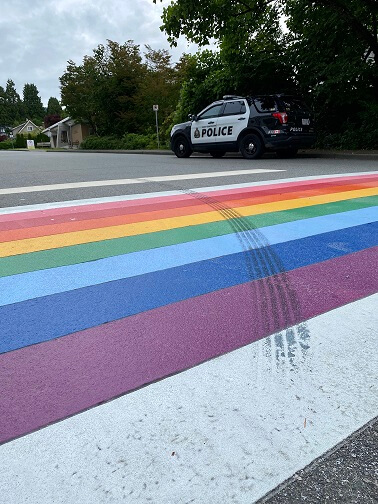
RC: You know what I try to I never do is say something where I might have to take it back or apologize. So when I sound like I’m talking in somewhat of a cagey fashion, I want to make sure that what I say I can stand on. I want to make sure I can give as much facts as I can, and when I can’t say it I want to be able to explain why I can’t say it.
Me: Yeah, no I think you were. Well it’s been 45 minutes I don’t want to take up any more of your time.
RC: Well we don’t always end up with conversations where we always agree, but hopefully we respect each other at the end. And you’ve had some of the most concise, and well thought out questions of anyone I’ve talked to in ages. And I thank you for not wasting 45 minutes of my time.
Me: And same from my end. Well thank you Constable Parker (again, Carver) and I hope I never have to talk to you again but it’s been nice.
RC: Okay, goodbye.
Me: Bye.
Well, there you have it. Aggravating, but an extremely productive call. I did most of the analysis that is needed throughout the piece, but I don’t think any reasonable person could conclude that there was justification for no hate crime charges/terrorism charges to be laid. Traveling for two hours out of your way to an enemy protest and ramming into four people with your car is close to the definition for political terrorism. Furthermore, the lack of charges means that they can’t explain what he said to the cops, since that would be prejudicial to the jury. It wouldn’t be if they charged him with terrorism, but since they didn’t it’s not longer relevant to his case.

Needless to say, Rob Carver was far less hostile than all the RCMP officers I have called into, and I picked up quite a few details on this call from him. The next step is for me to hunt down examples of the Winnipeg police doing behaviour contradictory to what is seen here. I will be trawling through hate crimes in Winnipeg as my next and most promising lead.

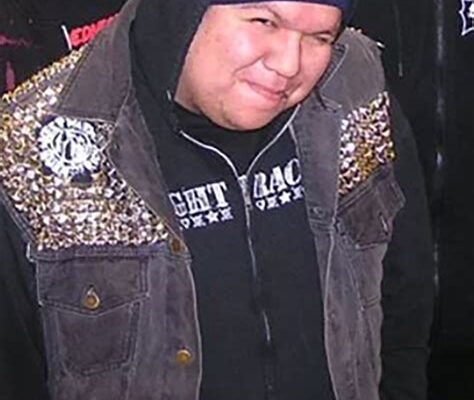
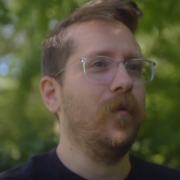
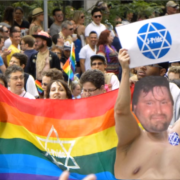
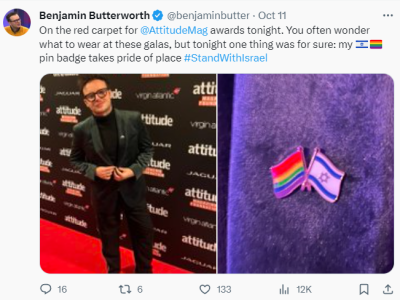
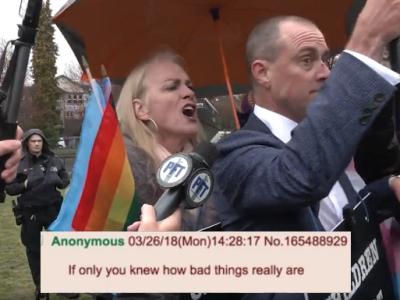
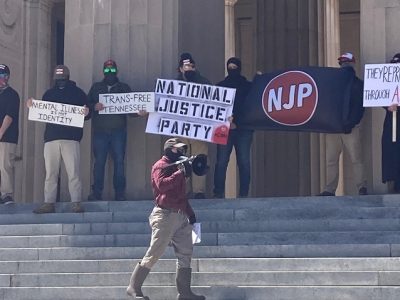
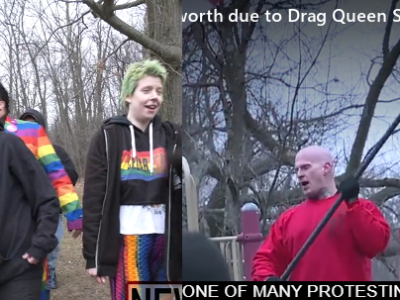
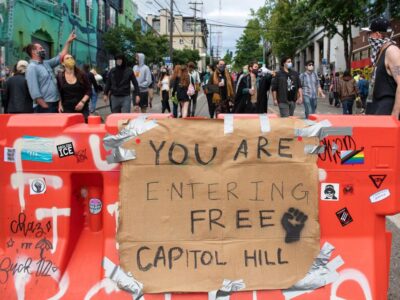
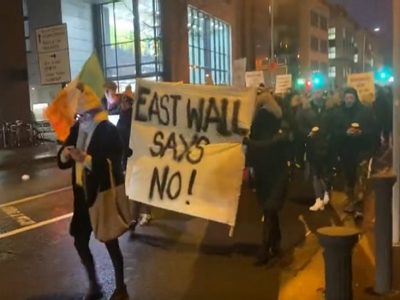
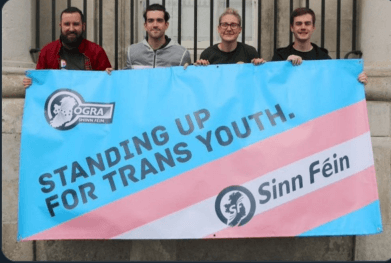
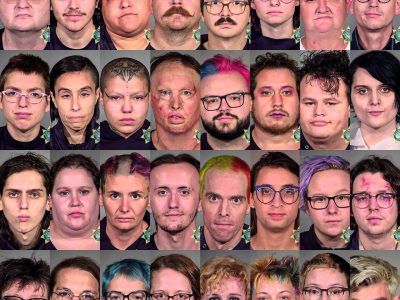
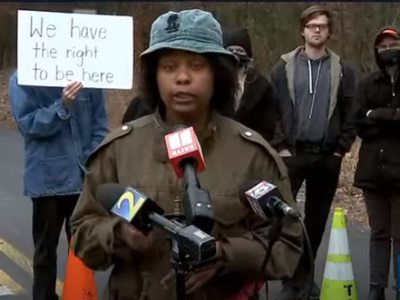
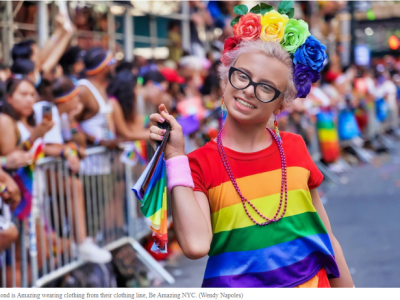
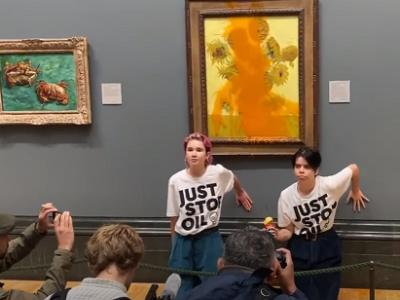
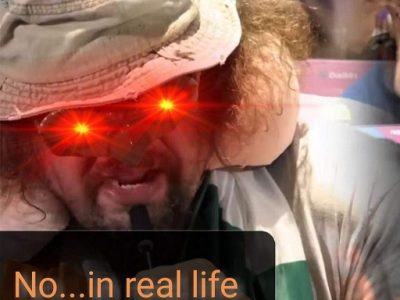
Amazing interview. Thanks.